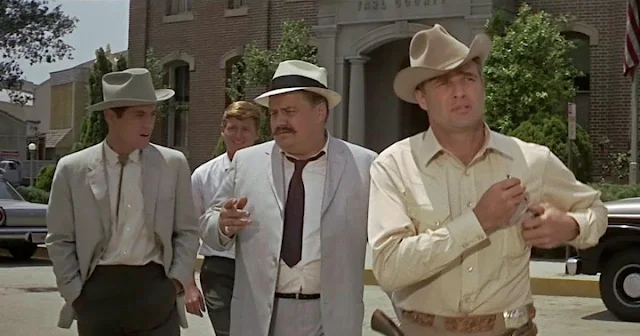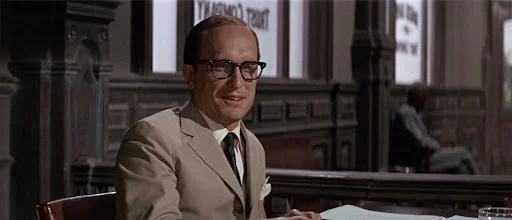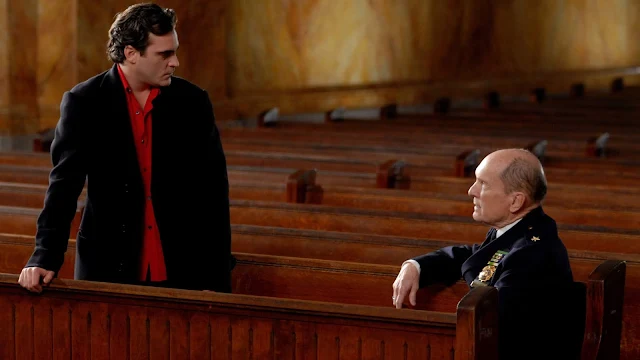Bad movies are often fun to watch anyway, and most of the people involved with The Chase, including director Arthur Penn, screenwriter Lillian Hellman, and star Marlon Brando, agreed that it was a bad movie. Brando let his opinion show, giving a sluggish performance that validates the old criticism that he mumbled his lines. Hellman had her script taken away and rewritten, and Penn struggled to deal with an ill-conceived project. The chief interest the film generates today is seeing actors like Jane Fonda, Robert Redford, and Robert Duvall on the brink of major stardom. There's a good deal of miscasting, including E.G. Mashall as the boss of a small town that seems to be in Texas or Louisiana. Marshall lacks the ruthless aura that the character needs. Angie Dickinson is wasted as the loving and dutiful wife of the town sheriff played by Brando. And Redford feels out of place in the role of Bubber Reeves, the town bad boy who escapes from prison (it's never quite clear what he did to be sent there) and stirs a manhunt, a lynch mob, and a conflagration in a junkyard. The town itself is a hotbed where everyone sleeps with everyone else's spouse and goes orgiastic on the Saturday night when the news of Bubber's escape breaks. It's a silly and lurid movie, but a little too long to be entertainingly bad.
A blog formerly known as Bookishness / By Charles Matthews
"Dazzled by so many and such marvelous inventions, the people of Macondo ... became indignant over the living images that the prosperous merchant Bruno Crespi projected in the theater with the lion-head ticket windows, for a character who had died and was buried in one film and for whose misfortune tears had been shed would reappear alive and transformed into an Arab in the next one. The audience, who had paid two cents apiece to share the difficulties of the actors, would not tolerate that outlandish fraud and they broke up the seats. The mayor, at the urging of Bruno Crespi, explained in a proclamation that the cinema was a machine of illusions that did not merit the emotional outbursts of the audience. With that discouraging explanation many ... decided not to return to the movies, considering that they already had too many troubles of their own to weep over the acted-out misfortunes of imaginary beings."--Gabriel García Márquez, One Hundred Years of Solitude
Search This Blog
Showing posts with label Robert Duvall. Show all posts
Showing posts with label Robert Duvall. Show all posts
Friday, July 26, 2024
The Chase (Arthur Penn, 1966)
Cast: Marlon Brando, Jane Fonda, Robert Redford, E.G. Marshall, Angie Dickinson, Janice Rule, Miriam Hopkins, Martha Hyer, Richard Bradford, Robert Duvall, James Fox, Diana Hyland, Henry Hull, Jocelyn Brando. Screenplay: Lillian Hellman, based on a novel by Horton Foote. Cinematography: Joseph LaShelle. Production design: Richard Day. Film editing: Gene Milford. Music: John Barry.
Thursday, September 26, 2019
We Own the Night (James Gray, 2007)
We Own the Night (James Gray, 2007)
Cast: Joaquin Phoenix, Mark Walhberg, Robert Duvall, Eva Mendes, Alex Veadov, Danny Hoch, Moni Moshonov, Oleg Taktarov, Antoni Corone, Tony Musante, Dominic Colón, Yelena Solovey. Screenplay: James Gray. Cinematography: Joaquín Baca-Asay. Production design: Ford Wheeler. Film editing: John Axelrad. Music: Wojciech Kilar.
It takes real talent to embrace movie clichés as whole-heartedly as James Gray does in We Own the Night and still come up with a watchable and frequently suspenseful film. We've seen the mean streets of New York in the 1980s so often in the movies before. Cops continue to battle mobsters on TV series, and the tale of brothers who go in radically different ways is as old as myth. There are misfit girlfriends in countless movies about working-class families, along with wives who suffer as their husbands go out into danger, and what's a mobster movie without snitches and turncoats? There's even a big car chase. It's in the last, I think, that Gray shows off his skill as director, for instead of shooting the speeding cars from the outside, Gray puts us inside the car carrying our protagonist, as a gunman in the pursuing car fires at him. It's a sequence as visually confusing to the audience as it would be to an actual driver. Of course, it helps if you have a cast as capable of transcending the clichés as Joaquin Phoenix, Mark Wahlberg, and Robert Duvall are. We Own the Night was not highly praised on release -- it has a 57% "rotten" rating on Rotten Tomatoes -- but I think it's going to be one of those films that look better with age, when we recognize the skill with which it's made.
Sunday, February 26, 2017
Tomorrow (Joseph Anthony, 1972)
 |
| Olga Bellin and Robert Duvall in Tomorrow |
Sunday, December 11, 2016
Apocalypse Now (Francis Ford Coppola, 1979)
 |
| Martin Sheen in Apocalypse Now |
Col. Kurtz: Marlon Brando
Lt. Col. Kilgore: Robert Duvall
Jay "Chef" Hicks: Frederic Forrest
Lance B. Johnson: Sam Bottoms
Tyrone "Clean" Miller: Laurence Fishburne
Chief Phillips: Albert Hall
Col Lucas: Harrison Ford
Photojournalist: Dennis Hopper
Director: Francis Ford Coppola
Screenplay: John Milius, Francis Ford Coppola, Michael Herr
Based on a novel by Joseph Conrad
Cinematography: Vittorio Storaro
Production design: Dean Tavoularis
Film editing: Lisa Fruchtman, Gerald B. Greenberg, Walter Murch
The familiar story of the confused and sometimes disastrous making of Apocalypse Now has been told many times, and never better than by Francis Ford Coppola's wife, Eleanor, in her 1991 documentary Hearts of Darkness: A Filmmaker's Apocalypse. So it's not worth going into here, except to note that the subtitle of her film plays on both the current meaning of the word "apocalypse" -- i.e., a disaster of great magnitude -- and the original one: a disclosure or revelation. It might be said that the enormous expenditure and hardship that Francis Coppola experienced during the making of Apocalypse Now was revelatory, not only to Coppola but also to the film industry, which was reaching the limits of its tolerance of unconstrained visionary filmmaking. It would cross that limit the following year with Heaven's Gate, Michael Cimino's film that took down a venerable production force, United Artists, along with its director. Coppola's career, unlike Cimino's, would recover, but he would never again be the director he was in his prime, with the first two Godfather films. And American filmmaking would never again be as prone to take risks as it was in the 1970s. As for the film itself, Apocalypse Now remains one of the essential American movies if only because it epitomizes the nightmare that was the Vietnam War. Coppola deserves much of the credit for this embodiment of Lord Acton's familiar dictum: "Power tends to corrupt. Absolute power corrupts absolutely." But there are others who should share the credit with him, including screenwriters John Milius and Michael Herr, who made the connection between Joseph Conrad's tale of imperialism gone wrong, Heart of Darkness, and the war. The ambience of the film is largely the work of production designer Dean Tavoularis, cinematographer Vittorio Storaro, who won a well-deserved Oscar, and Walter Murch and his sound team, who also won. And while Marlon Brando's Kurtz is a disappointment and Martin Sheen never quite meets the demands of his role as Capt. Willard, they are surrounded by marvelous support from Robert Duvall, Frederic Forrest, Dennis Hopper, and a very young and almost unrecognizable Laurence Fishburne (billed as Larry), among others.
Thursday, March 10, 2016
Network (Sidney Lumet, 1976)
What everyone remembers about Network is its prescient look at the corruption of American television news. It's not just that the rantings of Howard Beale (Peter Finch) foreshadow the antics of Glenn Beck, Rush Limbaugh, and Bill O'Reilly, it's that where once TV news was in the hands of Edward R. Murrow and Walter Cronkite, trusted and avuncular, it's now dominated by Anderson Cooper and Megyn Kelly, glamorous and glib. But the chief problem is that recalling Network as a satire on television misses its real target: corporate capitalism. What we remember from the film is Beale's "I'm mad as hell and I'm not going to take it anymore," Diana Christensen (Faye Dunaway in perhaps her best performance) reaching orgasm at the very thought of improving her network's ratings, and Diana and Frank Hackett (Robert Duvall) conspiring to assassinate Beale after his ratings decline. What we should remember is that Beale's ratings decline because he decides to tell his audiences what he perceives as the truth: that they've become mere pawns in a multinational drive to subsume individuality into corporate identity. The key scene in the film really belongs to Ned Beatty as Arthur Jensen, the head of the Communications Corporation of America, the conglomerate that owns the network and that Beale has disclosed is about to be taken over by a Saudi Arabian conglomerate. In the voice of God, Jensen tells Beale, "There is only one holistic system of systems, one vast and immanent, interwoven, interacting, multivariate, multinational dominion of dollars. Petro-dollars, electro-dollars, multi-dollars, reichmarks, yens, rubles, pounds, and shekels. It is the international system of currency which determines the totality of life on this planet. That is the natural order of things today." But when Beale tries to share this epiphany with his audience, they forsake him. In other words, remembering Network as a satire on television is to mistake the symptom -- the dumbing-down of journalism (and it applies as well to print as to electronic media) -- for the disease: the cancer of corporate greed. The screenplay by Paddy Chayefsky is partly at fault for making Howard Beale and Diana Christensen and the old-fashioned TV news executive Max Schumacher (William Holden) the central figures of the film instead of Jensen. It might have been partly remedied if Jensen had been played by a figure of equal charisma to Finch, Dunaway, and Holden, instead of by Beatty, a likable character actor best known for being violated by mountain men in Deliverance (John Boorman, 1972). (That said, Beatty delivers a terrific performance in his big scene, which deservedly earned him an Oscar nomination.) In the end, Network is really a kind of nihilist satire, not far removed in that regard from Dr. Strangelove (Stanley Kubrick, 1964) in its presentation of a world without alternatives or saviors. It's an entertaining film, with terrific performances, but a depressing one.
Subscribe to:
Comments (Atom)

































